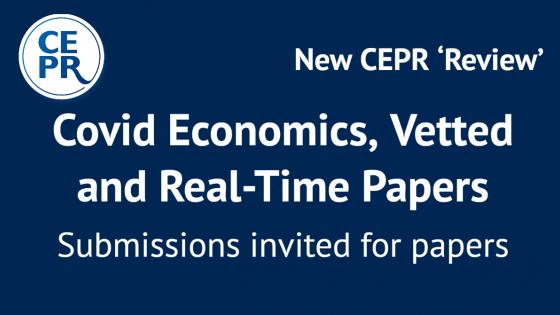The pandemic has inspired an explosion of economic research on an enormous range of topics. To use an unfortunately apt metaphor, the economics of COVID is in the acceleration phase of its epidemiological curve. The resulting research is – as is always the case in economics and other disciplines – of variable quality. Can decision makers trust the results?
To help bridge the gap between policy-relevant research and real-world decisionmakers, CEPR is today launching Covid Economics, a series that features emerging scholarly work on the Covid-19 epidemic.
Download Issue 1 of Covid Economics: Vetted and Real-Time Papers here
Inspiration for Covid Economics: Vetted and Real-Time Papers comes from the natural sciences. Journals like Nature, Science and The Lancet are radically faster in publishing than economics journals (weeks instead of years), but in some cases even weeks is too long. The research results can literally be a matter of life and death – as demonstrated by the rash of COVID-relevant findings on sites like Medrxiv.org.
This new effort is linked to CEPR’s long-standing research-reality bridging effort, VoxEU.org (founded in May 2007).
Time to move beyond instant, thought pieces
COVID-19 hit the world so fast and so hard, it took policymakers around the world by surprise – but especially in the US and Europe, where the lessons of previous epidemics like SARS, MERS, and Ebola were quickly forgotten. The economic profession’s response has been rapid and has helped policymakers think about the instant, and enormous policy packages they have put in place.
Many of which have already appeared on VoxEU, including the dozens of chapters in the eBooks published on 6 March (Economics in the Time of COVID-19, edited by Richard Baldwin and Beatrice Weder di Mauro), and on 18 March (Mitigating the COVID Economic Crisis: Act Fast and Do Whatever It Takes, also edited by Baldwin and Weder di Mauro). These instant thought-pieces have been enormously helpful, but now the hard work begins.
Policy and decisions need to be guided by careful, but rapid empirical and theoretical research. Having an objective definition of ‘careful’ that steers between the guardrails of ‘too slow’ and ‘too loose’ is critical if the profession is to contribute to the fight against this global menace. The new vehicle, Covid Economics, aims to contribute to achieving this balance.
Having an objective definition of ‘careful’ that steers between the guardrails of ‘too slow’ and ‘too loose’ is critical if the profession is to contribute to the fight against this global menace. The new vehicle, Covid Economics, aims to contribute to achieving this balance.
All topics welcomed
The COVID-19 outbreak challenges all areas of economics including, but not only, health, industrial organisation, labour, trade, macroeconomics, finance, history, development, inequality, political economy, and public finance. It concerns theory as well as empirical evidence. A large Editorial Board has been assembled to be able to deal with all these aspects. We also aim to have a wide geographical coverage.
Submissions will be promptly evaluated by the Editorial Board, over a maximum of 48 hours, on an accept/reject basis, i.e. no resubmission and no referee reports. When a handful of papers are accepted, an issue of Covid Economics will be posted online by CEPR Press. Thus, the frequency of the review will be determined endogenously. We consider this to be a preprint, which is common in medicine where results have to be out quickly as input into the debate; it will still be possible to submit papers to a traditional journal at a later date. CEPR-affiliated researchers may also issue them in the CEPR Discussion Papers series.
Submissions can be made online at https://cepr.org/content/covid-economics-vetted-and-real-time-papers. We are looking for reasonable-length contributions that make a clear contribution to our theoretical or empirical understanding of any matters related to the COVID fight. Accepted papers can be placed in other discussion papers series, and they are not considered as having been ‘published’ any more than a paper put into the CEPR Discussion Paper or NBER Working Paper series are considered ‘published’.
The vetting makes it clear that the selection process is uncompromising in terms of quality but completely free of the usual back-and-forth of standard review processes. There will be no referee reports, only an email from the Editor, Charles Wyplosz (who was one of the founding editors of the journal Economic Policy).
Ethics
Covid Economics will publish high quality analyses of economic aspects of the health crisis. However, the pandemic also raises a number of complex ethical issues. Economists tend to think about trade-offs, in this case lives vs. costs, patient selection at a time of scarcity, and more. In the spirit of academic freedom, neither the Editors of Covid Economics nor CEPR take a stand on these issues and therefore do not bear any responsibility for views expressed in the journal’s articles. The founder is Beatrice Weder di Mauro.
Editorial Board
Editor: Charles Wyplosz; Founder: Beatrice Weder di Mauro
Viral V. Acharya, Stern School of Business, NYU and CEPR
Guido Alfani, Bocconi University and CEPR
Franklin Allen, Imperial College Business School and CEPR
Oriana Bandiera, LSE and CEPR Markus K Brunnermeier, Princeton University and CEPR
Michael C. Burda, Humboldt Universitaet zu Berlin and CEPR
Paola Conconi, ECARES, Universite Libre de Bruxelles and CEPR
Giancarlo Corsetti, University of Cambridge and CEPR
Mathias Dewatripont, ECARES, Universite Libre de Bruxelles and CEPR
Barry Eichengreen, University of California, Berkeley and CEPR
Simon J. Evenett, University of St Gallen and CEPR
Antonio Fatás, INSEAD Singapore and CEPR
Francesco Giavazzi, Bocconi University and CEPR
Christian Gollier, Toulouse School of Economics and CEPR
Rachel Griffith, Institute for Fiscal Studies, University of Manchester and CEPR
Beata Javorcik, EBRD and CEPR
Per Krusell, Stockholm University and CEPR
Philippe Martin, Sciences Po and CEPR
Warwick McKibbin, ANU College of Asia and the Pacific
Kevin Hjortshøj O’Rourke, NYU Abu Dhabi and CEPR
Barbara Petrongolo, Queen Mary University, London, LSE and CEPR Richard Portes, London Business School and CEPR
Carol Propper, Imperial College London and CEPR
Lucrezia Reichlin, London Business School and CEPR
Ricardo Reis, London School of Economics and CEPR
Hélène Rey, London Business School and CEPR
Dominic Rohner, University of Lausanne and CEPR
Moritz Schularick, University of Bonn and CEPR
Paul Seabright, Toulouse School of Economics and CEPR
Christoph Trebesch, Christian- Albrechts-Universitaet zu Kiel and CEPR Thierry Verdier, Paris School of Economics and CEPR
Jan C. van Ours, Erasmus School of Economics
Karen-Helene Ulltveit-Moe, University of Oslo and CEPR
References
Baldwin, R and B Weder Mauro (2020a), Economics in the Time of COVID-19, a VoxEU.org eBook, CEPR Press.
Baldwin, Richard and B Weder di Mauro (2020b), Mitigating the COVID economic crisis: Act fast and do whatever it takes, a VoxEU.org eBook, CEPR Press.



